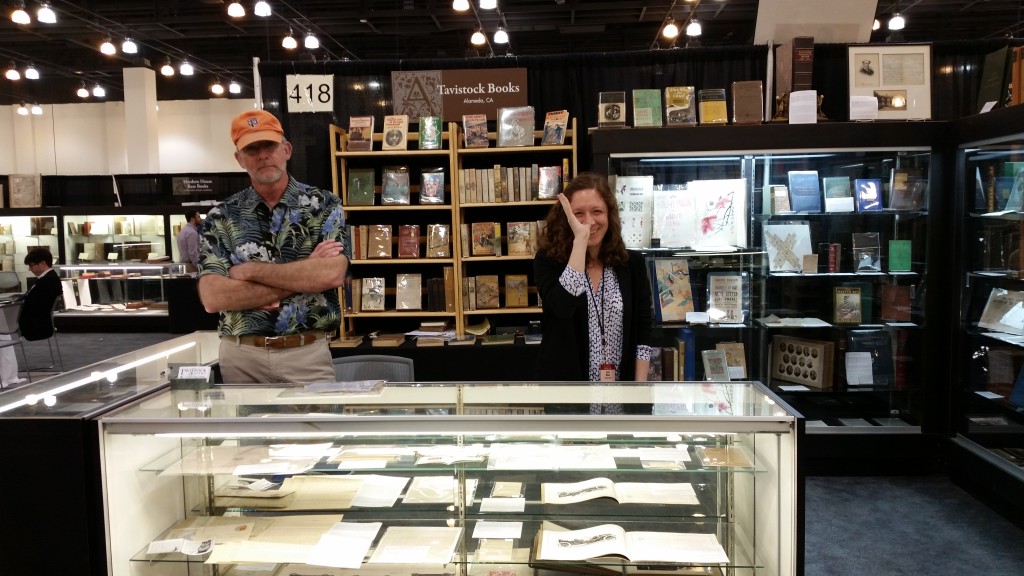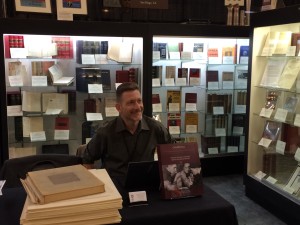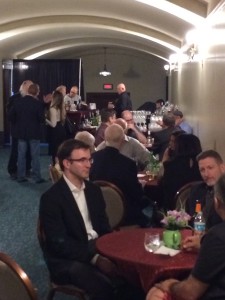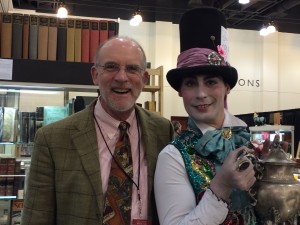This past weekend Team Tavistock (Vic Zoschak & Kate Mitas) braved the 49th Annual California International Antiquarian Book Fair. How was it, you ask? Well, we’ve asked Ms. Mitas and she kindly volunteered her thoughts on the fair. Find out below!

Team Tavistock! The lovely duo in all their book-loving glory. (Disclaimer: I told Vic to make this face right before taking this picture. He is a genial person. We promise.)
By Kate Mitas
It is a truth universally acknowledged that a bookseller in possession of a good book must be in want of a buyer. Book buyers being rather fickle creatures, however, and booksellers being notoriously short of cash, the art of uniting a book with its owner-to-be can be a delicate affair, engineered by the bookseller with the same gnawing anxiety and outsized hopefulness as that of a zookeeper trying to persuade members of an endangered species to mate. Spacious, but comfortable, environs are helpful in such instances, as are a plenitude of books, booksellers, and potential book buyers from around the globe, to increase the likelihood of a successful match. And, of course, lovely weather never hurts.
Enter the annual California International Antiquarian Book Fair.

New ABAA member (and our friend) Marc Kuritz of Churchill Book Collector smiles at the opening of the fair!
Held in the Pasadena Convention Center this year, the largest antiquarian book fair in the country had all of these things going for it, and more. Well-lit and suitably grand, with plush grey carpeting covering the floor and dark, tasteful drapery dividing the booths down eight long aisles, the convention center housed over 200 dealers and some of their most magnificent stock, and did so with nary a hitch. The combined might of White Rain Productions and the dauntless ABAA volunteer committee, headed by Michael Thompson, ensured that everything from the easy load-in, to the well-stocked exhibitor snack room, to the requisite permits for the ABAA charity poker tournament were all taken care of before anyone could raise much of a fuss (okay, some disgruntled muttering was heard from time to time regarding the snack room, but that’s inevitable). Security was tight, snappily dressed, and both professional and friendly with the bookish crowd; the temperature inside, once the fair officially started, was neither too cool nor too hot. Attendance was predictably good, if not the clamoring hordes of collectors everyone would have preferred. In terms of operational efficiency, the general consensus seemed to be that the fair ran with exquisite smoothness.
Even I, still a relative newbie to the fair circuit, and a first-timer on this side of the counter at an ABAA fair, knew enough to be impressed by the well-oiled machinery underlying the event. The same sense of smoothness seemed to carry over into the Tavistock booth, as load-in – really nothing more strenuous than a quick drive down the ramp at the convention center parking garage, and then a stroll around the neighborhood while our books were brought up by the loading crews – turned into a luxuriously long setup, followed by a quick change of clothes before the crowd started spilling in on Friday afternoon. After that, it just came down to selling books — arguably, the most important part, but I’ll get to that in a minute.
None of this is to say that we didn’t have our usual share of book fair mishaps. For starters, our booth was missing a glass case, and we had to track it down before we could do much in the way of unpacking. Then the corner of the table supporting our two folding bookcases cracked and began to buckle overnight, which meant we had to get a new table in on Friday morning and redo everything on the cases (as you may have already guessed, by “we” here I mean “I”). My “fancy day” outfit demanded to be rectified at the last minute, and rightly so, and though I remembered to scrape the blue price stickers off the soles of my black heels before too many fair-goers had wandered in, the shoes I’d thought were a solid thrift store find turned out to be duds: part of the right heel broke off not long into that opening day, giving my already less than graceful heel-wearing gait an added surreptitious limp, and leading to the sad discovery that I’d left our Sharpie marker back at the shop.
Yet, this time around, it all felt, well, par for the course. Simply working the fair, my biggest one so far, my first ABAA fair even, seemed . . . normal. Which, quite frankly, was weird.
And which is why I now have a confession to make: I have been an antiquarian bookselling spy.
Not a spy for anyone, mind you — don’t sic ABAA security on me just yet. No, instead I have been a spy, of sorts, from the used and rare book world from whence I came, and where I spent the preceding eight years of my life in the book trade before moving to Tavistock.
The used and rare market isn’t, of course, actually separate from the antiquarian trade. In fact, for some dealers, the two are very nearly one and the same: within the many permutations of the book business, there are plenty of antiquarian booksellers with open shops and a large quantity of general stock, just as there are plenty of used and rare booksellers with significant antiquarian stock. The distinction is in large measure a matter of how a bookseller defines herself, I suspect, and in which community she chooses to invest the majority of her energies, funds, and knowledge. (I also suspect that many of you have other, or better, definitions for these terms. Bear with me.)
In my case, the two bookstores I worked for had a far greater preponderance of used than rare material, a significant investment in and reliance on their local communities, and the kind of more limited dealings with collectors and institutions that makes me feel comfortable distinguishing them from the purely antiquarian trade. The demands and joys of running an open shop took precedence; material valued at more than a few thousand dollars was unlikely to pass through the doors. Yet, while I may not have learned the ins and outs of collating or the rigors of bibliographic description, I did learn what I still take to be the one of the most basic tenets of the trade: that the job of a bookseller is, simply, to put the right book in the right hands.
That’s a tenet that’s easier to follow, however, when one is dealing primarily with the public, and can point to sales of $1.50 and $1500 on the same day as proof that a book’s value exists irrespective of the price tag on it. It strains credulity to make the same claim when the books you sell exclude all but the wealthiest pairs of hands.
Or so it has seemed sometimes, as, over the course of the past seven months, I have on the one hand been utterly delighted with some of the material that has crossed my desk and grown frankly callous about the prices attached to it, and yet, on the other hand, have found myself stalled at book fair booths or dinners with colleagues, making knee-jerk comparisons of the prices of things to my average annual income or the cost of the house it took my parents 30 years to pay off, and wondering what the hell I was doing there. Such comparisons do a rank disservice to everyone and everything involved, of course, and it seems likely that the authors of at least a few of the books in question, who surely knew some bookseller’s assistants in their time, would have been mortally offended at having their life’s lasting work held up to my meager income. But knowing that didn’t keep me from wondering. Was the antiquarian trade just about selling expensive books to rich people? Had I sold my bookselling soul for a living wage and the chance to actually research the material I cataloged?
If this sounds a bit like a form of snobbery, well, it is. Because the truth is, I was wrong. But being, as usual, a stubborn idiot, it took the largest antiquarian book fair in the country to convince me of that.
Antiquarian booksellers are a deceptive-looking lot, what with their general friendliness, bookish ways, frequently somewhat rumpled appearance, and ability to drink like fish at a moment’s notice. You might not appreciate at first glance the depths of trade knowledge and specialization honeycombing their businesses, which are, more often than not, simply themselves. And the same holds true of their booths at these book fairs: loving displays of beautiful and, yes, expensive books that reveal nothing of the boxes of dreck, smelly basements, second mortgages, years of self-education, and successful gambles that enabled those books to appear in all their bright glory on a glass shelf at a book fair somewhere. Until, one day, at, say, the 49th California International Antiquarian Book Fair, you do.
Whether it was the fact that I recognized more of the items on display at this book fair for the truly amazing things they are, or the internationality of the affair, or the number of eager collectors, librarians, and other dealers poring over the stock, or the humbling amount of dealers who stopped by to offer their thoughts about their success or lack thereof at this fair and were, without fail, kind as ever to this newbie, it slowly dawned on me that the “right book, right hands” theory of bookselling could still apply in the antiquarian world. Each booth was a kind of sounding, showing the depths of a dealer’s knowledge, beckoning like-minded folk. It’s unlikely that I’ll ever have a collection myself, I gradually realized, but . . . if the opportunity arose to sell something as cool as some of the things I saw, expensive or not? Well, I’d be okay with that.
But what, you’re surely wondering, does any of this have to do how the good ship Tavistock fared?
Much as I wish I could report my first successful book fair, I cannot. The official word here, in fact, is “soft,” and I’ll leave you to interpret that as you will. Groups of customers drifted up to the display cases like schools of minnows into the shade of a rock, and the gentlest greeting, even to someone else entirely, would send them skittering away. No big fish came by, and those medium fish that did bought lightly. Lots of things sold from the Discovery shelves of under $100 items; whether that translates to increased collecting or is simply an indication of economic stratification, remains to be seen. The aisles, which had been like pneumatic tubes propelling assistants from booth to booth with packages at the start of the fair, slowly turned to clogged thoroughfares of laden dealers grimly trying to ignore their aching feet as they lugged final piles of invoiced items to their colleagues up the way, and a few of those piles came to us, so the buying wasn’t too bad. But, again, the expenses of attending the fair weighed heavily, too heavily, against our anemic sales.
The plush carpeting was getting ripped up during load-out, exposing swathes of pale concrete beneath the luxurious facade. The draperies have surely been taken down and folded, the metal poles stacked in a supply closet somewhere; the security guards have taken off their suits and sunglasses, had beers, and moved on to other gigs. The transitory bibliomecca has moved on to other oases. And as we drove away from Pasadena early Monday morning in a disappointed funk, dreading the final tally, it occurred to me that at any given time, some bookseller, somewhere, was digging through a box, lugging a sign out to the sidewalk, putting a book in someone’s hand, and trying, always, to outsmart, out buy, and — invariably, incredibly — help out their colleague competitors. It’s an absurd profession in its way, and a noble one. And, in the end, we’re all just hustling, hustling, hustling to stay in the game.
Godspeed, friends.



